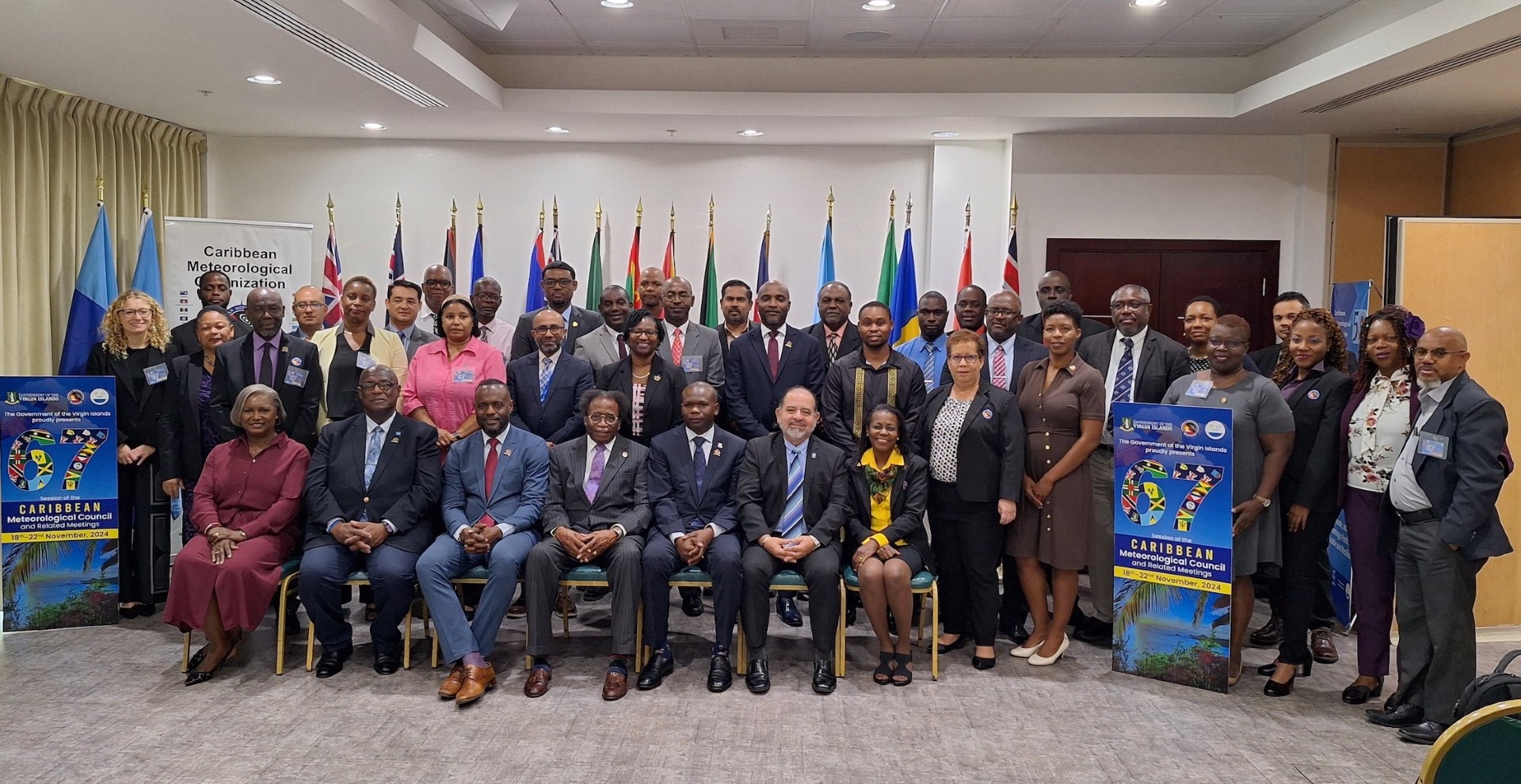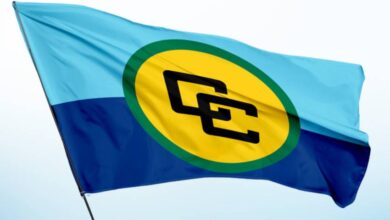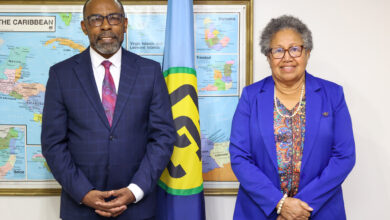The Caribbean Meteorological Council (CMC), the ministerial-level organ of the Caribbean Meteorological Organization (CMO) which represents 16 Member States, convened its 67th Session (CMC67) on 21-22 November 2024, in Tortola, Virgin Islands (British) at Maria’s By The Sea. Under the auspices of the Government of the Virgin Islands, the CMC focused on advancing governance, strategy, and operational capacity related to weather, climate, and water-related activities across the region.
The CMC reviewed previous and planned actions to implement the United Nations Early Warnings for All Initiative (EW4ALL) and contributions to sustainable development priorities. The Council endorsed the development of a USD 25 million project to upgrade Doppler Weather Radars and strengthen Multi-Hazard Early Warning Systems (MHEWS), and supported the CMO’s implementation of activities in the Climate Risk and Early Warning Systems (CREWS) Caribbean Project Phase 2 for the benefit of regional National Meteorological and Hydrometeorological Services (NMHSs).
At the opening of CMC67, Keynote Speaker and Chair of the 67th Council, the Honourable Kye M. Rymer, Minister of Communications and Works of the Virgin Islands, issued a call to action to “reaffirm our shared commitment to delivering early warnings for all and ensuring that our meteorological services and their core partners…are equipped to meet the demands for a climate-resilient Caribbean.” The outgoing Chair of the CMC, Honourable Marvin Gonzales, Minister of Public Utilities of Trinidad and Tobago recalled that, during his tenure, the CMO and its Organs “remained steadfast” in enhancing observational and warning systems while expanding the climate services and building technical and human capacity to “deliver scientific expertise and advice to the people of our region”.
Prof. Celeste Saulo, Secretary-General, World Meteorological Organization (WMO), reaffirmed WMO’s commitment to strengthening the meteorological services across the Caribbean. She highlighted the WMO’s active collaboration with other United Nations agencies in advancing the Small Island Developing Stated (SIDS) agenda, and emphasised ongoing efforts to expand key initiatives, including the Severe Weather Forecasting Programme for the Caribbean, the activities of the Hurricane Committee, the Climate Services and Related Applications (ClimSA) initiative, and development of new hydrological services tailored to the Caribbean region.
The CMO Headquarters Coordinating Director, Dr. Arlene Laing, described the 67th Council as “a continuation of a shared partnership, which holds historical importance for a regional meteorology community at the forefront of climate change”. She highlighted the valuable and vital role of National Meteorological Services, referencing warnings for Hurricane Beryl as an example. Despite causing catastrophic destruction in Grenada, St. Vincent and the Grenadines, and Jamaica, timely and accurate forecasts and warnings by the National Meteorological Services saved lives. Dr. Laing noted that the death toll was markedly lower compared to similar hurricanes in the past, and recent hurricanes in the United States during 2024.
Encouraged by these statements, the Council focused on building and strengthening capacities for delivering effective Multi-Hazard Early Warning Systems (MHEWS) under the United Nations Early Warnings for All global initiative for climate change adaptation. During the Session, the Council agreed on variety of projects and activities including, inter alia:
Supporting the CMO Headquarters’ implementation of Climate Risk and Early Warnings Systems (CREWS) Caribbean Phase 2 projects, including:
o Common Alerting Protocol (CAP) Implementation Workshops in three Small Island Developing States (SIDS) to improve warning dissemination and communication
o Strengthening of capacities in Lightning Detection and Awareness Building;
o Standard Operating Procedures (SOPs) between National Meteorological and Hydrometeorological Services and National Disaster Management Organizations;
o Development of National Strategic Plans and Frameworks for Weather, Water, and Climate Services;
o Operational transition of the Severe Weather Forecasting Programme and familiarisation missions for operational forecasters on a limited basis;
o Strengthening collaboration and understanding among NMHSs, NDMOs, and the Media.
Endorsing the development of a funding proposal by the CMO Headquarters and Caribbean Development Bank (CDB) to upgrade Doppler weather radars in Belize and Trinidad and Tobago, and strengthen MHEWS governance, risk knowledge, hazard monitoring, detection, analysis, and forecasting, warning dissemination and communication, and disaster preparedness and response under the Green Climate Fund (GCF) CREWS Scaling Framework.
Supporting the implementation of a common weather radar data format to facilitate interoperability, data exchange, archive and retrieval, and radar applications.
Approving the establishment of a CMO Operational WMO Information System Node Execution Team to manage and troubleshoot issues related to the international exchange and availability of high-quality meteorological and climate observations.
As a regional governance platform, CMC67 delegates included Ministers, Permanent Secretaries, Directors of National Meteorological Services, and the Board of Governors of the Caribbean Institute for Meteorology and Hydrology (CIMH). Observers included Météo-France (Antilles-Guyane), The University of the West Indies, the Caribbean Agricultural Development Institute (CARDI), the Caribbean Telecommunications Union (CTU), who attended for the first time, and senior representatives from global agencies such as the World Meteorological Organization (WMO), International Civil Aviation Organization (ICAO), United Nations Office for Disaster Risk Reduction (UNDRR), and other stakeholders.
Preceding the Council’s 67th Session were two closed sessions of the CMO: The Board of Governors of the Caribbean Institute for Meteorology and Hydrology (CIMH) meeting on 18-19 November and the Annual Meeting of Directors of Meteorological Services on 20 November; both of which reported to the Council. The CMO extends its heartfelt appreciation to the Government and People of the Virgin Islands (British) for their kind, culturally-focused hospitality. (Caribbean Meteorological Organisation Press Release)
About the CMO
The Caribbean Meteorological Organization (CMO) is a specialized agency of the Caribbean Community that coordinates the joint scientific and technical activities in weather, climate and water – related sciences in sixteen English-speaking Caribbean countries (Anguilla, Antigua and Barbuda, Barbados, Belize, British Virgin Islands, Cayman Islands, Dominica, Grenada, Guyana, Jamaica, Montserrat, St. Kitts and Nevis, Saint Lucia, St. Vincent and the Grenadines, Trinidad and Tobago, Turks and Caicos Islands). The Organs of the CMO are: (i) The Caribbean Meteorological Council (CMC)-Governing Body of the CMO, (ii) The Headquarters Unit (Secretariat), headed by a Coordinating Director, located in Trinidad and Tobago; (iii) The Caribbean Institute for Meteorology and Hydrology (CIMH) located in Barbados; and (iv) The Caribbean Meteorological Foundation (CMF). The CMO originated from the British Caribbean
Meteorological Service, founded in 1951.
About the CMC
The Caribbean Meteorological Council, is the Governing Body of the Caribbean Meteorological Organization (CMO), a specialized agency of the Caribbean Community (CARICOM). The Council was established by its Member States in 1962 to further the regionalization of meteorology in the Anglophone Caribbean. The CMC comprises government Ministers responsible for meteorology, hydrology and aviation, or their representatives, and meets annually to, among others, set policy, approve projects and budgets. For further details on the Caribbean Meteorological Organization, the Caribbean Meteorological Council, and their meetings, visit http://www.cmo.org.tt/meetings.html





